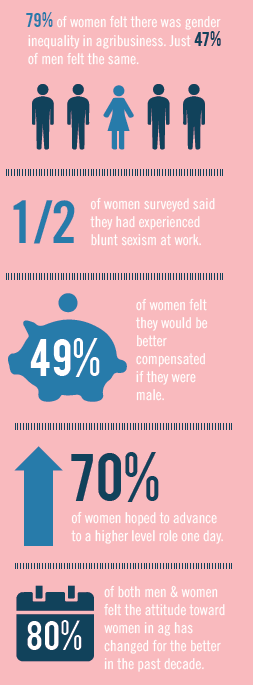- Candidates
- Login
- Set Up Account
- Create a Job Alert
- Search Tools
- Resources
- Employers
FOR IRIS MECK, owner of Iris Meck Communications Inc. and creator of the Advancing Women Conference held in Canada, it’s clear that women have not always been accepted or treated equally in the agricultural industry.
“When I started my career, it was a different time,” Meck said. “Women were being passed over for promotions in favour of male colleagues. Women not being taken seriously was a bigger issue, with the assumption being that they were only going to be working for a few years until they got married, had children, etc. This sort of attitude really prevented women from rising in companies.”
Shelby LaRose, Crop Production Advisor with CPS Canada and former AgCareers.com Campus Ambassador at the University of Saskatchewan (pictured above), has also learned these struggles just beginning her career in agriculture.
“The majority of customers that I deal with on a daily basis are male,” LaRose said. “Some of them are great to work with because they know I have four years of schooling to back up any decisions I make. Others sometimes have an issue taking my opinion seriously because I am female and these customers would prefer to deal with someone else (preferably male).”
While both men and women today would tell you that the perception of women in agriculture today has changed for the better, a study done by AgCareers.com in 2015 sheds light on the issues still faced by women in agriculture. There were a significantly higher percentage of men in a President/CEO role, Director and management positions while there were more women in hourly and salaried staff roles.
The more than 2,000 respondents were also asked for their current base salary in this survey done by AgCareers.com. Responses indicate a disparity in pay between genders with men typically earning more than women in agribusiness.
Despite these results that demonstrate a wage and hierarchy gap in agribusiness, this AgCareers.com study also revealed that more than ninety percent of both men and women believe that women are an integral part of agriculture.
“I find women tend to be more open-minded and patient when it comes to tough situations,” LaRose said. “We have the ability to make the best of the situation in order to benefit both our best interests and our customer’s best interests.”
“Companies now view the diversity in perspectives and opinions that women bring to an organization as crucial for business success,” Meck said. “Organizations now actively look for ways to make their company more attractive to potential female hires. Women are capable, resilient and resourceful. Everyone wins when hiring and promoting is done on the basis of talent and ability; not gender.”
Meck noted that she has had to take risks during her career as a woman in agriculture but credits her “determination, commitment, long hours, and a broad network” with contributing to her successful journey. When asked about her advice for young women pursuing agricultural careers, Meck stressed the importance of confidence.
“Women often feel that they have to be completely ready before making the next step in their career, but I would encourage women to push ahead,” Meck said. “Risk can be a great learning experience. Oftentimes the best things in life come from when you push yourself out of your comfort zone and work through a challenge.”
“Don’t be afraid to dig in, get dirty and ask lots of questions,” LaRose answered when asked about her advice for young women in agriculture. “You need to be able to jump in and lend a hand in all situations. Trust me when I say the help will be appreciated no matter your gender. Agriculture isn’t something that one person can do on their own, we all need to join forces and work together as a team!”
You can view the full “Gender Roles & Equality in Agribusiness” survey report, which includes more information about working parents in agriculture and gender equality in agribusiness compared to business overall, on /track-report-downloads.cfm?ID=64
